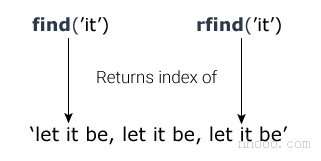编辑这个页面须要登录或更高权限!
- 您刚才的请求只有这个用户组的用户才能使用:自动确认用户
- 如果您还没有登录请登录后重试。编程那点事是一个开放式网站,修改本站大部分内容仅须要花10秒钟时间创建一个账户。 如果您已经登录,本页面可能是受保护的内容。如果您认为有修改的必要,请联系本站管理人员。
- 该页面已被锁定以防止编辑。
Python 字符串 rfind() 使用方法及示例
rfind()方法返回字符串最后一次出现的位置(从右向左查询),如果没有匹配项则返回-1。
rfind()的语法为:
str.rfind(sub[, start[, end]] )
rfind()参数
rfind()方法最多使用三个参数:
sub- 它是在str字符串中要搜索的子字符串。
start和end (可选)-在str[start:end]其中搜索子字符串
rfind()返回值
rfind()方法返回一个整数值。
如果子字符串存在于字符串中,则它返回找到子字符串的最大索引。
如果字符串中不存在子字符串,则返回-1。

示例1:没有开始和结束参数的rfind()
quote = 'Let it be, let it be, let it be'
result = quote.rfind('let it')
print("子字符串 'let it':", result)
result = quote.rfind('small')
print("子字符串 'small ':", result)
result = quote.rfind('be,')
if (result != -1):
print("be 出现的地方最大的索引值:", result)
else:
print("不包含子字符串")运行该程序时,输出为:
子字符串 'let it': 22 子字符串 'small ': -1 be 出现的地方是最的索引值: 18
示例2:带有开始和结束参数的rfind()
quote = 'Do small things with great love'
#搜索子字符串 'hings with great love'
print(quote.rfind('things', 10))
# 搜索子字符串 ' small things with great love'
print(quote.rfind('t', 2))
# 搜索子字符串 'hings with great lov'
print(quote.rfind('o small ', 10, -1))
# 搜索子字符串 'll things with'
print(quote.rfind('th', 6, 20))运行该程序时,输出为:
-1 25 -1 18
- Copyright © 2003-2013 菜鸟教程。
- 版权与免责声明
